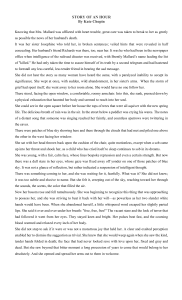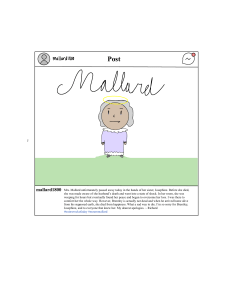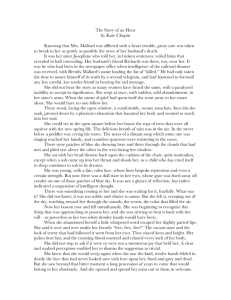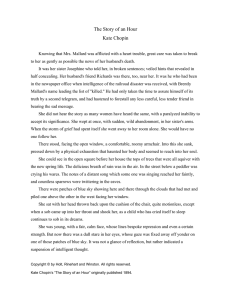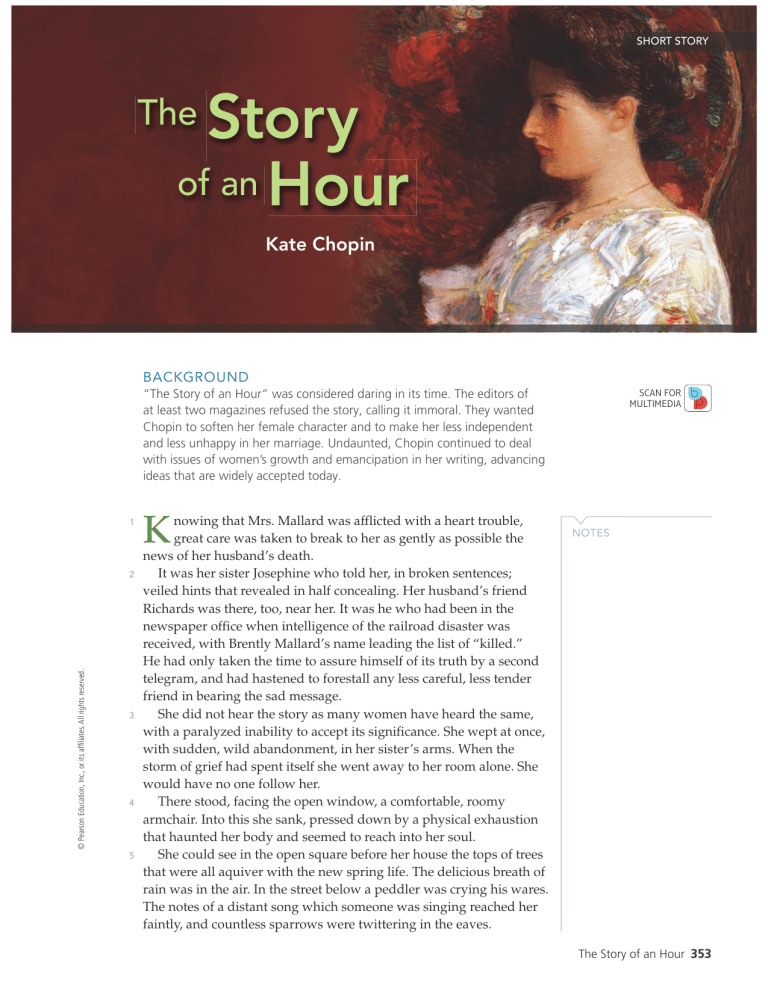
SHORT STORY Story of an Hour The Kate Chopin BACKGROUND “The Story of an Hour” was considered daring in its time. The editors of at least two magazines refused the story, calling it immoral. They wanted Chopin to soften her female character and to make her less independent and less unhappy in her marriage. Undaunted, Chopin continued to deal with issues of women’s growth and emancipation in her writing, advancing ideas that are widely accepted today. 1 © Pearson Education, Inc., or its affiliates. All rights reserved. 2 3 4 5 K nowing that Mrs. Mallard was afflicted with a heart trouble, great care was taken to break to her as gently as possible the news of her husband’s death. It was her sister Josephine who told her, in broken sentences; veiled hints that revealed in half concealing. Her husband’s friend Richards was there, too, near her. It was he who had been in the newspaper office when intelligence of the railroad disaster was received, with Brently Mallard’s name leading the list of “killed.” He had only taken the time to assure himself of its truth by a second telegram, and had hastened to forestall any less careful, less tender friend in bearing the sad message. She did not hear the story as many women have heard the same, with a paralyzed inability to accept its significance. She wept at once, with sudden, wild abandonment, in her sister’s arms. When the storm of grief had spent itself she went away to her room alone. She would have no one follow her. There stood, facing the open window, a comfortable, roomy armchair. Into this she sank, pressed down by a physical exhaustion that haunted her body and seemed to reach into her soul. She could see in the open square before her house the tops of trees that were all aquiver with the new spring life. The delicious breath of rain was in the air. In the street below a peddler was crying his wares. The notes of a distant song which someone was singing reached her faintly, and countless sparrows were twittering in the eaves. SCAN FOR MULTIMEDIA NOTES The Story of an Hour 353 7 8 9 10 11 Mark familiar word parts or indicate another strategy you used that helped you determine meaning. 12 persistence (puhr SIHS tuhns) n. MEANING: 13 14 15 imploring (ihm PLAWR ihng) v. MEANING: There were patches of blue sky showing here and there through the clouds that had met and piled one above the other in the west facing her window. She sat with her head thrown back upon the cushion of the chair, quite motionless, except when a sob came up into her throat and shook her, as a child who has cried itself to sleep continues to sob in its dreams. She was young, with a fair, calm face, whose lines bespoke repression and even a certain strength. But now there was a dull stare in her eyes, whose gaze was fixed away off yonder on one of those patches of blue sky. It was not a glance of reflection, but rather indicated a suspension of intelligent thought. There was something coming to her and she was waiting for it, fearfully. What was it? She did not know; it was too subtle and elusive to name. But she felt it, creeping out of the sky, reaching toward her through the sounds, the scents, the color that filled the air. Now her bosom rose and fell tumultuously. She was beginning to recognize this thing that was approaching to possess her, and she was striving to beat it back with her will—as powerless as her two white slender hands would have been. When she abandoned herself a little whispered word escaped her slightly parted lips. She said it over and over under her breath: “free, free, free!” The vacant stare and the look of terror that had followed it went from her eyes. They stayed keen and bright. Her pulses beat fast, and the coursing blood warmed and relaxed every inch of her body. She did not stop to ask if it were or were not a monstrous joy that held her. A clear and exalted perception enabled her to dismiss the suggestion as trivial. She knew that she would weep again when she saw the kind, tender hands folded in death; the face that had never looked save with love upon her, fixed and gray and dead. But she saw beyond that bitter moment a long procession of years to come that would belong to her absolutely. And she opened and spread her arms out to them in welcome. There would be no one to live for during those coming years; she would live for herself. There would be no powerful will bending hers in that blind persistence with which men and women believe they have a right to impose a private will upon a fellow creature. A kind intention or a cruel intention made the act seem no less a crime as she looked upon it in that brief moment of illumination. And yet she had loved him—sometimes. Often she had not. What did it matter! What could love, the unsolved mystery, count for in the face of this possession of self-assertion which she suddenly recognized as the strongest impulse of her being! “Free! Body and soul free!” she kept whispering. Josephine was kneeling before the closed door with her lips to the keyhole, imploring for admission. “Louise, open the door! I beg; open the door—you will make yourself ill. What are you doing, Louise? For heaven’s sake open the door.” 354 70+6r219'42416'56#0&%*#0)' © Pearson Education, Inc., or its affiliates. All rights reserved. 6 NOTES 16 17 18 19 20 21 “Go away. I am not making myself ill.” No; she was drinking in a very elixir of life1 through that open window. Her fancy was running riot along those days ahead of her. Spring days, and summer days, and all sorts of days that would be her own. She breathed a quick prayer that life might be long. It was only yesterday she had thought with a shudder that life might be long. She arose at length and opened the door to her sister’s importunities. There was a feverish triumph in her eyes, and she carried herself unwittingly like a goddess of Victory. She clasped her sister’s waist, and together they descended the stairs. Richards stood waiting for them at the bottom. Someone was opening the front door with a latchkey. It was Brently Mallard who entered, a little travel-stained, composedly carrying his gripsack2 and umbrella. He had been far from the scene of the accident, and did not even know there had been one. He stood amazed at Josephine’s piercing cry; at Richards’ quick motion to screen him from the view of his wife. But Richards was too late. When the doctors came they said she had died of heart disease—of the joy that kills. ❧ NOTES Mark familiar word parts or indicate another strategy you used that helped you determine meaning. importunities (ihm pawr TOO n. nuh teez) MEANING: 1. elixir of life mythical liquid believed to prolong a person’s life indefinitely. 2. gripsack small bag for holding clothes; suitcase. Comprehension Check Complete the following items after you finish your first read. Review and clarify details with your group. © Pearson Education, Inc., or its affiliates. All rights reserved. 1. What medical problem afflicts Mrs. Mallard? 2. What news does Mrs. Mallard receive as the story opens? 3. As Mrs. Mallard sits alone in her room, what word does she keep whispering to herself? 4. What happens when Brently Mallard turns up, alive? 5. Notebook Write a summary of the story to confirm your understanding. RESEARCH Research to Explore This story may spark your curiosity to learn more. Briefly research a relevant topic that interests you. You may want to share what you discover with your group. The Story of an Hour 355 MAKING MEANING Close Read the Text With your group, revisit sections of the text you marked during your first read. Annotate details that you notice. What questions do you have? What can you conclude? THE STORY OF AN HOUR CITE TEXTUAL EVIDENCE to support your answers. Analyze the Text GROUP DISCUSSION Listen carefully as others present their ideas so that you do not simply repeat their words when your turn comes. Try to add something new to the discussion. Notebook Complete the activities. 1. Review and Clarify With your group, discuss the ending of the story. Do you agree with the doctors’ evaluation? Why, or why not? 2. Present and Discuss Now, work with your group to share the passages from the selection that you found especially important. Take turns presenting your passages. Discuss what you noticed in the selection, the questions you asked, and the conclusions you reached. 3. Essential Question: In what ways does the struggle for freedom change with history? What has this text taught you about the struggle for freedom? Discuss with your group. LANGUAGE DEVELOPMENT Concept Vocabulary persistence WORD NETWORK Add words related to struggle from the text to your Word Network. importunities Why These Words? The three concept vocabulary words from the text are related. With your group, discuss the words, and determine what the words JCXGKPEQOOQP*QYFQVJGUGYQTFEJQKEGUGPJCPEGVJG|VGZV! Practice Notebook Use a dictionary or thesaurus to find and record two synonyms for each of the concept vocabulary words. Then, write a sentence that explains how you think Chopin’s word choices affect readers’ understanding of the story. Share your sentences with your group. STANDARDS RL.11–12.2 Determine two or more themes or central ideas of a text and analyze their development over the course of the text, including how they interact and build on one another to produce a complex account; provide an objective summary of the text. RL.11–12.3 Analyze the impact of the author’s choices regarding how to develop and relate elements of a story or drama. L.11–12.5.b Analyze nuances in the meaning of words with similar denotations. Word Study Notebook Denotation and Connotation The denotation of a word is its dictionary meaning. Connotation refers to the shades of meaning a word conveys. As Mrs. Mallard sits in her room, she hears Josephine’s importunities for her to open the door. The denotation of the word is “instances of persistent begging.” The connotation, however, suggests that such begging is especially annoying. Use a thesaurus to find four other words that mean “to beg,” and think about their connotations. Then, list the words in order—from least to most forceful, or from most negative to most positive. 356 70+6r219'42416'56#0&%*#0)' © Pearson Education, Inc., or its affiliates. All rights reserved. imploring
